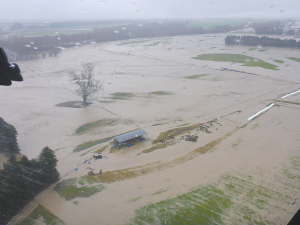Insurance Council urges bold action
The Insurance Council of New Zealand (ICNZ) is urging the Government to take a leadership role on climate adaptation and build New Zealand’s resilience against the impacts of climate change on lives and property.
 The Insurance Council of New Zealand is advising residents in the Tairawhiti and Hawke's Bay areas to get claims in early following heavy rain in the region.
The Insurance Council of New Zealand is advising residents in the Tairawhiti and Hawke's Bay areas to get claims in early following heavy rain in the region.
In light of recent heavy rain and flooding in the Tairawhiti and Hawke’s Bay region, the Insurance Council of New Zealand (ICNZ) is advising those in the region to put their safety first and contact their insurer early if their property is hit by floods or slips.
Gisborne Mayor Rehette Stoltz declared a State of Emergency last night in the Tairawhiti area after heavy rain fell and rivers started to rise in an already sodden region.
“This gives our whānau and community a chance to self-evacuate and make preparations to ensure they are self-sufficient for at least the next three days,” Stoltz said.
ICNZ says that while, as of Thursday evening, there hadn’t been any reports of widespread property damage, insurers would do their best to deal with new claims.
However, those claims will be coming in on top of the 19,786 combined claims for Tairawhiti and Hawke’s Bay as a result of Cyclone Gabrielle. Those claims, according to ICNZ, have topped $1 billion.
“After all that people have been through in recent times, its heartbreaking to hear of yet another Red Heavy Rain Warning, State of Emergency in Tairawhiti and evacuations,” says ICNZ chief executive Tim Grafton.
Grafton says insurers will continue to do their best to assist the people in the affected areas through both this event and the ongoing recovery from the series of disastrous weather events that hit the country earlier this year.
“Contact your insurer early if you suffer flood or storm damage, especially if you need to arrange temporary accommodation or emergency repairs; which should only be done if it is safe to do so,” says Grafton.
“Even if you already have a claim in from events earlier in the year, or have done repair work since then, it’s essential any new damage is properly recorded and reported to your insurer.”
For many, the quickest way to lodge a claim will be through their insurer’s website.
Insurance Advice
Fonterra executive René Dedoncker is leaving the co-operative later this year to lead Australian agribusiness Elders.
Alliance Group and the Southland Stags rugby team have joined forces in a partnership that will see the the meat co-operative's farmgate brand feature on players' team kits and replica jerseys.
Fonterra's plan to expand its organic programme to the South Island is being well received by farmers, the co-op says.
Voting has started for the renewal of DairyNZ's milksolids levy.
The most successful catchment groups in NZ are those that have 'a source to sea' approach.
Associate Agriculture Minister and Manawatu dairy farmer Andrew Hoggard says the free trade agreement (FTA) negotiated with India is not a bad deal and his party, Act, will support it when it goes before Parliament.

OPINION: Here w go: the election date is set for November 7 and the politicians are out of the gate…
OPINION: ECan data was released a few days ago showing Canterbury farmers have made “giant strides on environmental performance”.